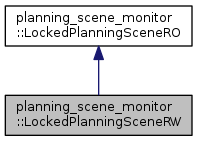This is a convenience class for obtaining access to an instance of a locked PlanningScene. More...
#include <planning_scene_monitor.h>

Public Member Functions | |
| LockedPlanningSceneRW (const PlanningSceneMonitorPtr &planning_scene_monitor) | |
| operator const planning_scene::PlanningScenePtr & () | |
| const planning_scene::PlanningScenePtr & | operator-> () |
 Public Member Functions inherited from planning_scene_monitor::LockedPlanningSceneRO Public Member Functions inherited from planning_scene_monitor::LockedPlanningSceneRO | |
| const PlanningSceneMonitorPtr & | getPlanningSceneMonitor () |
| LockedPlanningSceneRO (const PlanningSceneMonitorPtr &planning_scene_monitor) | |
| operator bool () const | |
| operator const planning_scene::PlanningSceneConstPtr & () const | |
| const planning_scene::PlanningSceneConstPtr & | operator-> () const |
Additional Inherited Members | |
 Protected Member Functions inherited from planning_scene_monitor::LockedPlanningSceneRO Protected Member Functions inherited from planning_scene_monitor::LockedPlanningSceneRO | |
| void | initialize (bool read_only) |
| LockedPlanningSceneRO (const PlanningSceneMonitorPtr &planning_scene_monitor, bool read_only) | |
| MOVEIT_CLASS_FORWARD (SingleUnlock) | |
 Protected Attributes inherited from planning_scene_monitor::LockedPlanningSceneRO Protected Attributes inherited from planning_scene_monitor::LockedPlanningSceneRO | |
| SingleUnlockPtr | lock_ |
| PlanningSceneMonitorPtr | planning_scene_monitor_ |
Detailed Description
This is a convenience class for obtaining access to an instance of a locked PlanningScene.
Instances of this class can be used almost exactly like instances of a PlanningScenePtr because of the typecast operator and "operator->" functions. Therefore you will often see code like this:
The function "getRobotModel()" is a member of PlanningScene and not a member of this class. However because of the "operator->" here which returns a PlanningScenePtr, this works.
Only one of these "ReadWrite" locks can exist at a given time. The intention is that users which need to write to the PlanningScene will use these, preventing other writers and readers from locking the same PlanningScene at the same time.
- See also
- LockedPlanningSceneRO
Definition at line 690 of file planning_scene_monitor.h.
Constructor & Destructor Documentation
|
inline |
Definition at line 693 of file planning_scene_monitor.h.
Member Function Documentation
|
inline |
Definition at line 698 of file planning_scene_monitor.h.
|
inline |
Definition at line 703 of file planning_scene_monitor.h.
The documentation for this class was generated from the following file: